Management Functions, Organizing, Leadership: A Detailed Report
VerifiedAdded on 2021/05/31
|7
|1619
|43
Report
AI Summary
This report delves into the critical aspects of management, emphasizing the function of organizing and its impact on leadership. It examines the tasks and responsibilities involved in organizing within an organizational structure, highlighting the importance of efficient task management and delegation. The report provides insights from the author's experience as a team leader, illustrating how organizing facilitates coordination, resource allocation, and personnel development. It explores the consequences of inadequate organizing, such as inefficiency, lack of coordination, and communication breakdowns, and provides real-world examples, including the Dieselgate scandal, to underscore the importance of effective management practices. The report concludes by emphasizing the essential role of proper organizing in fostering growth, job security, and overall organizational success.
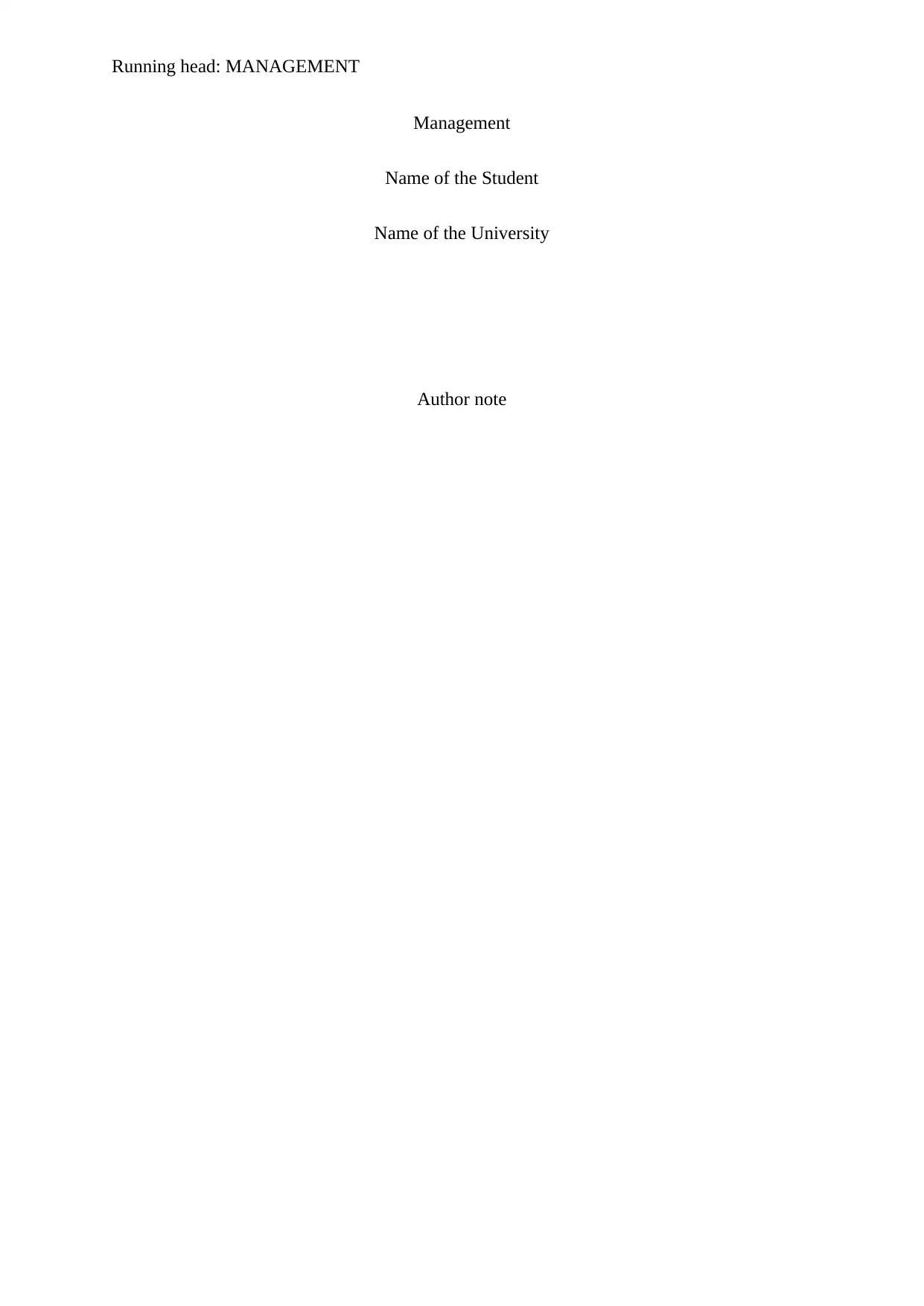
Running head: MANAGEMENT
Management
Name of the Student
Name of the University
Author note
Management
Name of the Student
Name of the University
Author note
Paraphrase This Document
Need a fresh take? Get an instant paraphrase of this document with our AI Paraphraser
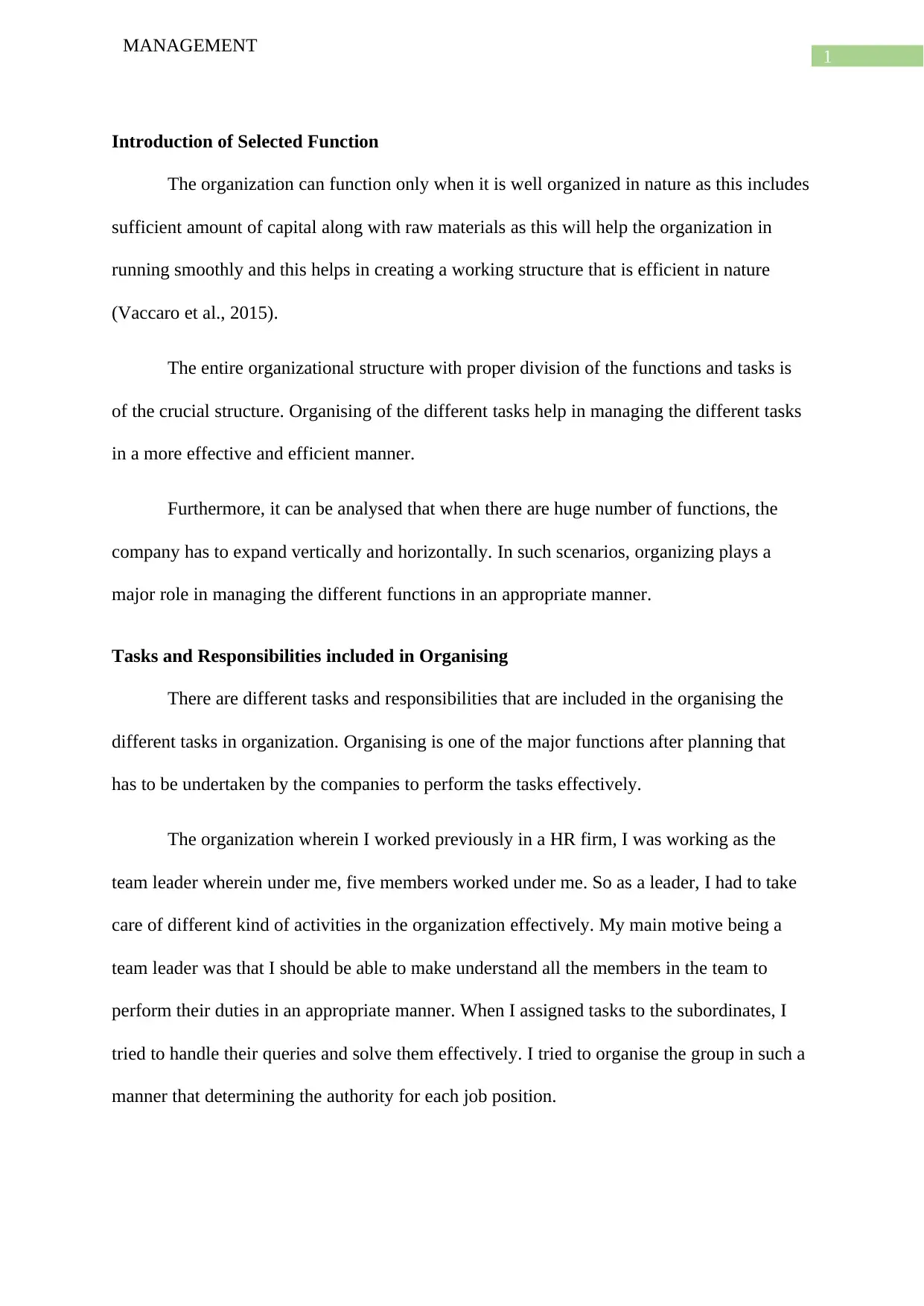
1
MANAGEMENT
Introduction of Selected Function
The organization can function only when it is well organized in nature as this includes
sufficient amount of capital along with raw materials as this will help the organization in
running smoothly and this helps in creating a working structure that is efficient in nature
(Vaccaro et al., 2015).
The entire organizational structure with proper division of the functions and tasks is
of the crucial structure. Organising of the different tasks help in managing the different tasks
in a more effective and efficient manner.
Furthermore, it can be analysed that when there are huge number of functions, the
company has to expand vertically and horizontally. In such scenarios, organizing plays a
major role in managing the different functions in an appropriate manner.
Tasks and Responsibilities included in Organising
There are different tasks and responsibilities that are included in the organising the
different tasks in organization. Organising is one of the major functions after planning that
has to be undertaken by the companies to perform the tasks effectively.
The organization wherein I worked previously in a HR firm, I was working as the
team leader wherein under me, five members worked under me. So as a leader, I had to take
care of different kind of activities in the organization effectively. My main motive being a
team leader was that I should be able to make understand all the members in the team to
perform their duties in an appropriate manner. When I assigned tasks to the subordinates, I
tried to handle their queries and solve them effectively. I tried to organise the group in such a
manner that determining the authority for each job position.
MANAGEMENT
Introduction of Selected Function
The organization can function only when it is well organized in nature as this includes
sufficient amount of capital along with raw materials as this will help the organization in
running smoothly and this helps in creating a working structure that is efficient in nature
(Vaccaro et al., 2015).
The entire organizational structure with proper division of the functions and tasks is
of the crucial structure. Organising of the different tasks help in managing the different tasks
in a more effective and efficient manner.
Furthermore, it can be analysed that when there are huge number of functions, the
company has to expand vertically and horizontally. In such scenarios, organizing plays a
major role in managing the different functions in an appropriate manner.
Tasks and Responsibilities included in Organising
There are different tasks and responsibilities that are included in the organising the
different tasks in organization. Organising is one of the major functions after planning that
has to be undertaken by the companies to perform the tasks effectively.
The organization wherein I worked previously in a HR firm, I was working as the
team leader wherein under me, five members worked under me. So as a leader, I had to take
care of different kind of activities in the organization effectively. My main motive being a
team leader was that I should be able to make understand all the members in the team to
perform their duties in an appropriate manner. When I assigned tasks to the subordinates, I
tried to handle their queries and solve them effectively. I tried to organise the group in such a
manner that determining the authority for each job position.
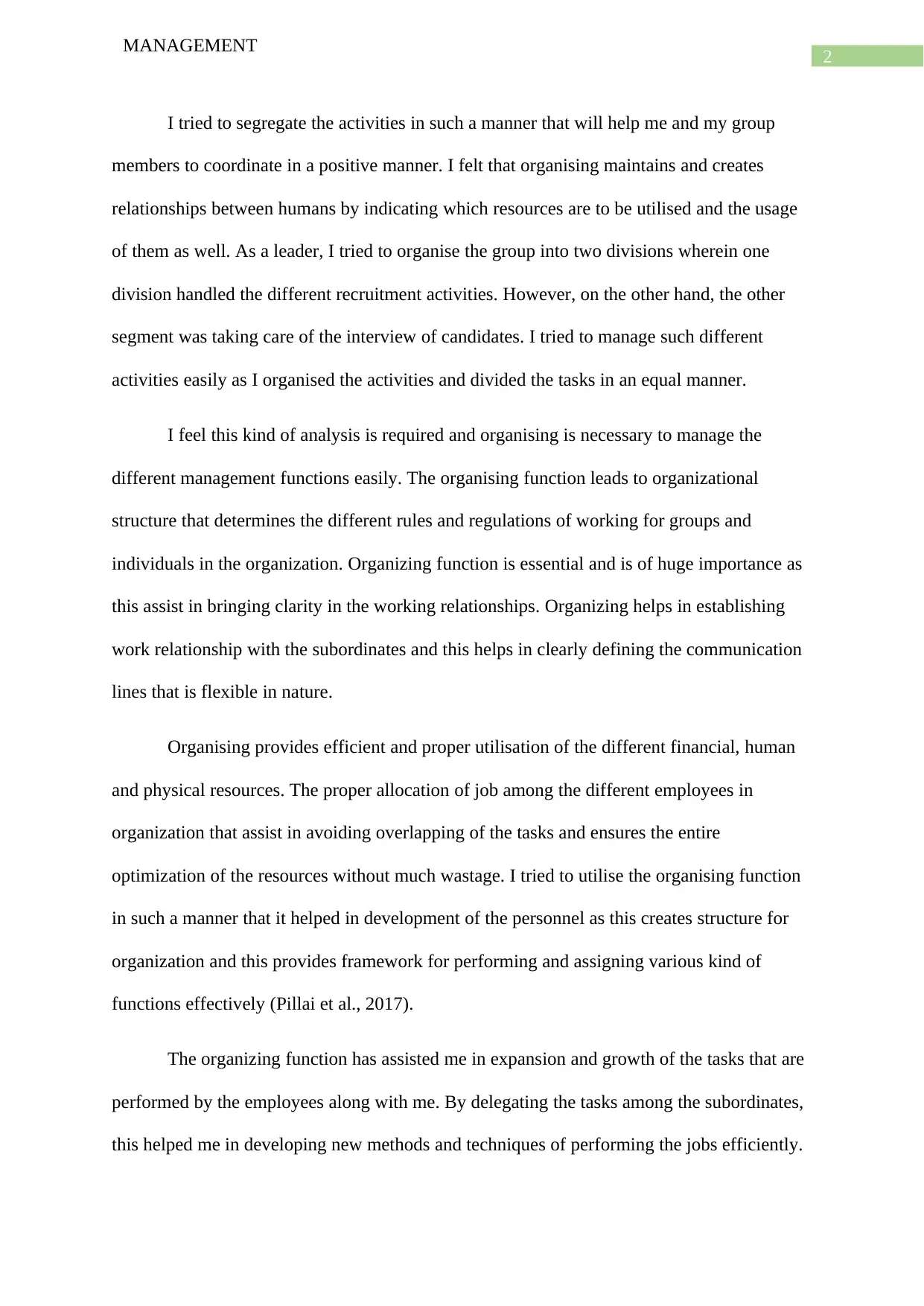
2
MANAGEMENT
I tried to segregate the activities in such a manner that will help me and my group
members to coordinate in a positive manner. I felt that organising maintains and creates
relationships between humans by indicating which resources are to be utilised and the usage
of them as well. As a leader, I tried to organise the group into two divisions wherein one
division handled the different recruitment activities. However, on the other hand, the other
segment was taking care of the interview of candidates. I tried to manage such different
activities easily as I organised the activities and divided the tasks in an equal manner.
I feel this kind of analysis is required and organising is necessary to manage the
different management functions easily. The organising function leads to organizational
structure that determines the different rules and regulations of working for groups and
individuals in the organization. Organizing function is essential and is of huge importance as
this assist in bringing clarity in the working relationships. Organizing helps in establishing
work relationship with the subordinates and this helps in clearly defining the communication
lines that is flexible in nature.
Organising provides efficient and proper utilisation of the different financial, human
and physical resources. The proper allocation of job among the different employees in
organization that assist in avoiding overlapping of the tasks and ensures the entire
optimization of the resources without much wastage. I tried to utilise the organising function
in such a manner that it helped in development of the personnel as this creates structure for
organization and this provides framework for performing and assigning various kind of
functions effectively (Pillai et al., 2017).
The organizing function has assisted me in expansion and growth of the tasks that are
performed by the employees along with me. By delegating the tasks among the subordinates,
this helped me in developing new methods and techniques of performing the jobs efficiently.
MANAGEMENT
I tried to segregate the activities in such a manner that will help me and my group
members to coordinate in a positive manner. I felt that organising maintains and creates
relationships between humans by indicating which resources are to be utilised and the usage
of them as well. As a leader, I tried to organise the group into two divisions wherein one
division handled the different recruitment activities. However, on the other hand, the other
segment was taking care of the interview of candidates. I tried to manage such different
activities easily as I organised the activities and divided the tasks in an equal manner.
I feel this kind of analysis is required and organising is necessary to manage the
different management functions easily. The organising function leads to organizational
structure that determines the different rules and regulations of working for groups and
individuals in the organization. Organizing function is essential and is of huge importance as
this assist in bringing clarity in the working relationships. Organizing helps in establishing
work relationship with the subordinates and this helps in clearly defining the communication
lines that is flexible in nature.
Organising provides efficient and proper utilisation of the different financial, human
and physical resources. The proper allocation of job among the different employees in
organization that assist in avoiding overlapping of the tasks and ensures the entire
optimization of the resources without much wastage. I tried to utilise the organising function
in such a manner that it helped in development of the personnel as this creates structure for
organization and this provides framework for performing and assigning various kind of
functions effectively (Pillai et al., 2017).
The organizing function has assisted me in expansion and growth of the tasks that are
performed by the employees along with me. By delegating the tasks among the subordinates,
this helped me in developing new methods and techniques of performing the jobs efficiently.
⊘ This is a preview!⊘
Do you want full access?
Subscribe today to unlock all pages.

Trusted by 1+ million students worldwide
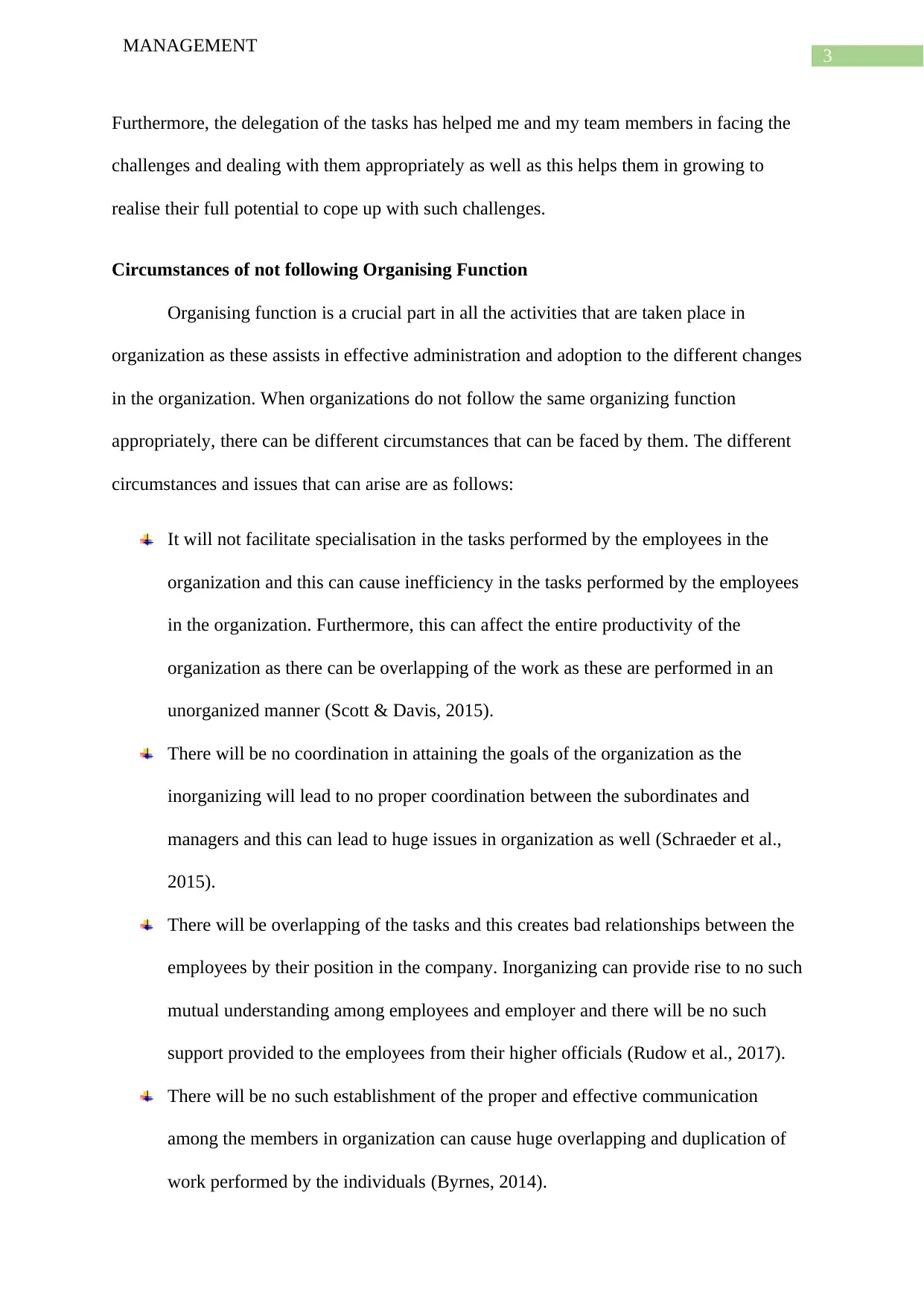
3
MANAGEMENT
Furthermore, the delegation of the tasks has helped me and my team members in facing the
challenges and dealing with them appropriately as well as this helps them in growing to
realise their full potential to cope up with such challenges.
Circumstances of not following Organising Function
Organising function is a crucial part in all the activities that are taken place in
organization as these assists in effective administration and adoption to the different changes
in the organization. When organizations do not follow the same organizing function
appropriately, there can be different circumstances that can be faced by them. The different
circumstances and issues that can arise are as follows:
It will not facilitate specialisation in the tasks performed by the employees in the
organization and this can cause inefficiency in the tasks performed by the employees
in the organization. Furthermore, this can affect the entire productivity of the
organization as there can be overlapping of the work as these are performed in an
unorganized manner (Scott & Davis, 2015).
There will be no coordination in attaining the goals of the organization as the
inorganizing will lead to no proper coordination between the subordinates and
managers and this can lead to huge issues in organization as well (Schraeder et al.,
2015).
There will be overlapping of the tasks and this creates bad relationships between the
employees by their position in the company. Inorganizing can provide rise to no such
mutual understanding among employees and employer and there will be no such
support provided to the employees from their higher officials (Rudow et al., 2017).
There will be no such establishment of the proper and effective communication
among the members in organization can cause huge overlapping and duplication of
work performed by the individuals (Byrnes, 2014).
MANAGEMENT
Furthermore, the delegation of the tasks has helped me and my team members in facing the
challenges and dealing with them appropriately as well as this helps them in growing to
realise their full potential to cope up with such challenges.
Circumstances of not following Organising Function
Organising function is a crucial part in all the activities that are taken place in
organization as these assists in effective administration and adoption to the different changes
in the organization. When organizations do not follow the same organizing function
appropriately, there can be different circumstances that can be faced by them. The different
circumstances and issues that can arise are as follows:
It will not facilitate specialisation in the tasks performed by the employees in the
organization and this can cause inefficiency in the tasks performed by the employees
in the organization. Furthermore, this can affect the entire productivity of the
organization as there can be overlapping of the work as these are performed in an
unorganized manner (Scott & Davis, 2015).
There will be no coordination in attaining the goals of the organization as the
inorganizing will lead to no proper coordination between the subordinates and
managers and this can lead to huge issues in organization as well (Schraeder et al.,
2015).
There will be overlapping of the tasks and this creates bad relationships between the
employees by their position in the company. Inorganizing can provide rise to no such
mutual understanding among employees and employer and there will be no such
support provided to the employees from their higher officials (Rudow et al., 2017).
There will be no such establishment of the proper and effective communication
among the members in organization can cause huge overlapping and duplication of
work performed by the individuals (Byrnes, 2014).
Paraphrase This Document
Need a fresh take? Get an instant paraphrase of this document with our AI Paraphraser
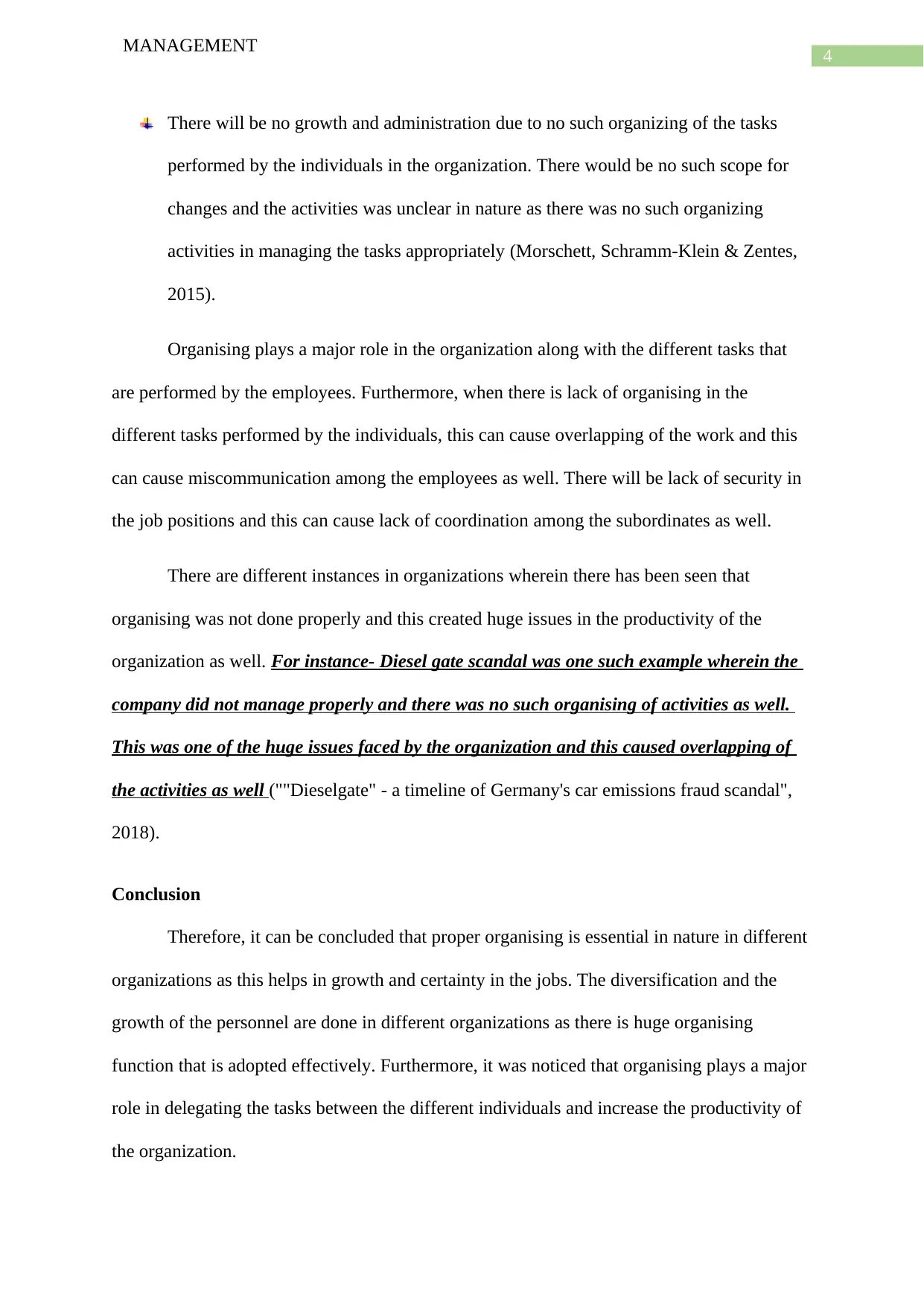
4
MANAGEMENT
There will be no growth and administration due to no such organizing of the tasks
performed by the individuals in the organization. There would be no such scope for
changes and the activities was unclear in nature as there was no such organizing
activities in managing the tasks appropriately (Morschett, Schramm-Klein & Zentes,
2015).
Organising plays a major role in the organization along with the different tasks that
are performed by the employees. Furthermore, when there is lack of organising in the
different tasks performed by the individuals, this can cause overlapping of the work and this
can cause miscommunication among the employees as well. There will be lack of security in
the job positions and this can cause lack of coordination among the subordinates as well.
There are different instances in organizations wherein there has been seen that
organising was not done properly and this created huge issues in the productivity of the
organization as well. For instance- Diesel gate scandal was one such example wherein the
company did not manage properly and there was no such organising of activities as well.
This was one of the huge issues faced by the organization and this caused overlapping of
the activities as well (""Dieselgate" - a timeline of Germany's car emissions fraud scandal",
2018).
Conclusion
Therefore, it can be concluded that proper organising is essential in nature in different
organizations as this helps in growth and certainty in the jobs. The diversification and the
growth of the personnel are done in different organizations as there is huge organising
function that is adopted effectively. Furthermore, it was noticed that organising plays a major
role in delegating the tasks between the different individuals and increase the productivity of
the organization.
MANAGEMENT
There will be no growth and administration due to no such organizing of the tasks
performed by the individuals in the organization. There would be no such scope for
changes and the activities was unclear in nature as there was no such organizing
activities in managing the tasks appropriately (Morschett, Schramm-Klein & Zentes,
2015).
Organising plays a major role in the organization along with the different tasks that
are performed by the employees. Furthermore, when there is lack of organising in the
different tasks performed by the individuals, this can cause overlapping of the work and this
can cause miscommunication among the employees as well. There will be lack of security in
the job positions and this can cause lack of coordination among the subordinates as well.
There are different instances in organizations wherein there has been seen that
organising was not done properly and this created huge issues in the productivity of the
organization as well. For instance- Diesel gate scandal was one such example wherein the
company did not manage properly and there was no such organising of activities as well.
This was one of the huge issues faced by the organization and this caused overlapping of
the activities as well (""Dieselgate" - a timeline of Germany's car emissions fraud scandal",
2018).
Conclusion
Therefore, it can be concluded that proper organising is essential in nature in different
organizations as this helps in growth and certainty in the jobs. The diversification and the
growth of the personnel are done in different organizations as there is huge organising
function that is adopted effectively. Furthermore, it was noticed that organising plays a major
role in delegating the tasks between the different individuals and increase the productivity of
the organization.
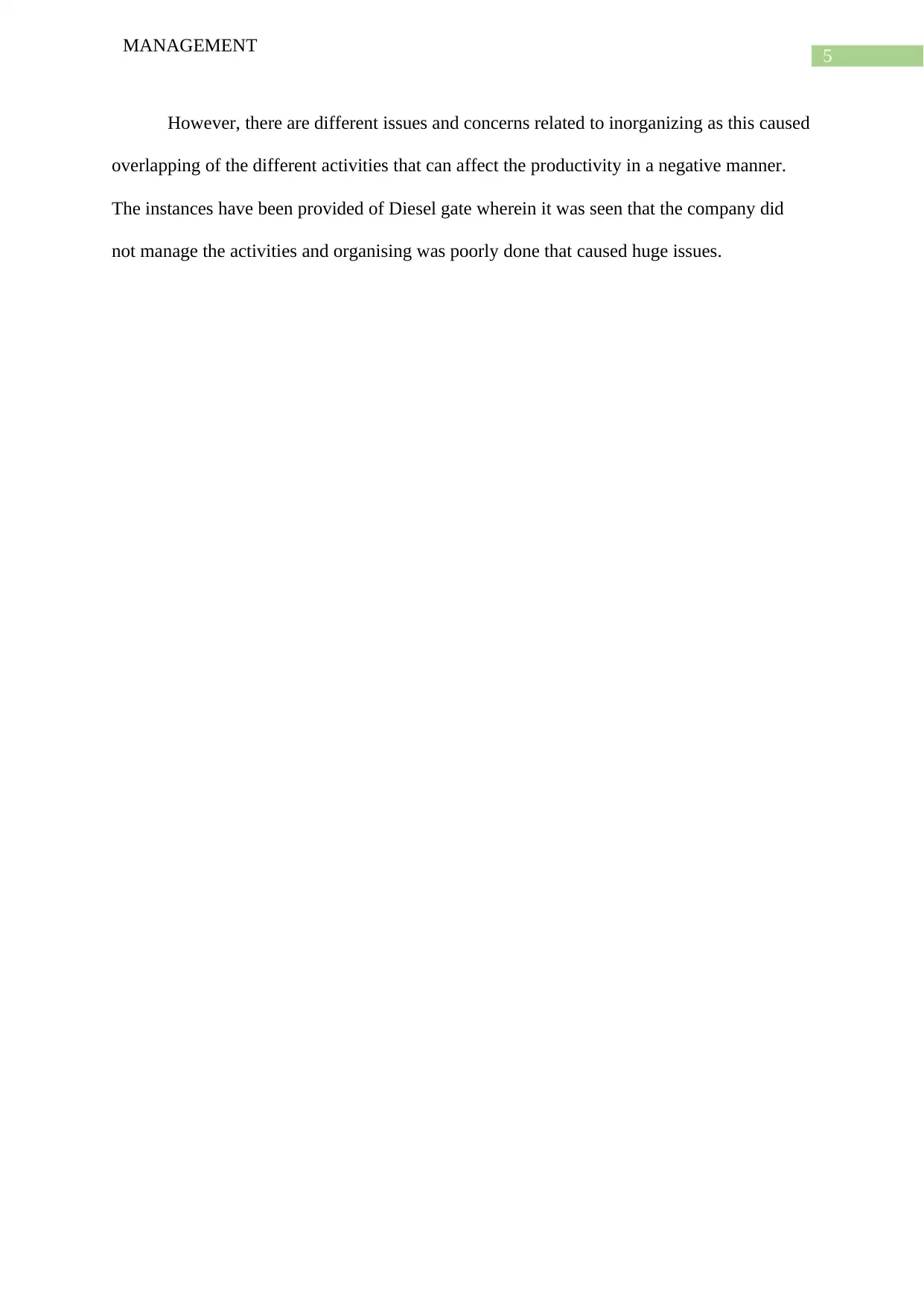
5
MANAGEMENT
However, there are different issues and concerns related to inorganizing as this caused
overlapping of the different activities that can affect the productivity in a negative manner.
The instances have been provided of Diesel gate wherein it was seen that the company did
not manage the activities and organising was poorly done that caused huge issues.
MANAGEMENT
However, there are different issues and concerns related to inorganizing as this caused
overlapping of the different activities that can affect the productivity in a negative manner.
The instances have been provided of Diesel gate wherein it was seen that the company did
not manage the activities and organising was poorly done that caused huge issues.
⊘ This is a preview!⊘
Do you want full access?
Subscribe today to unlock all pages.

Trusted by 1+ million students worldwide
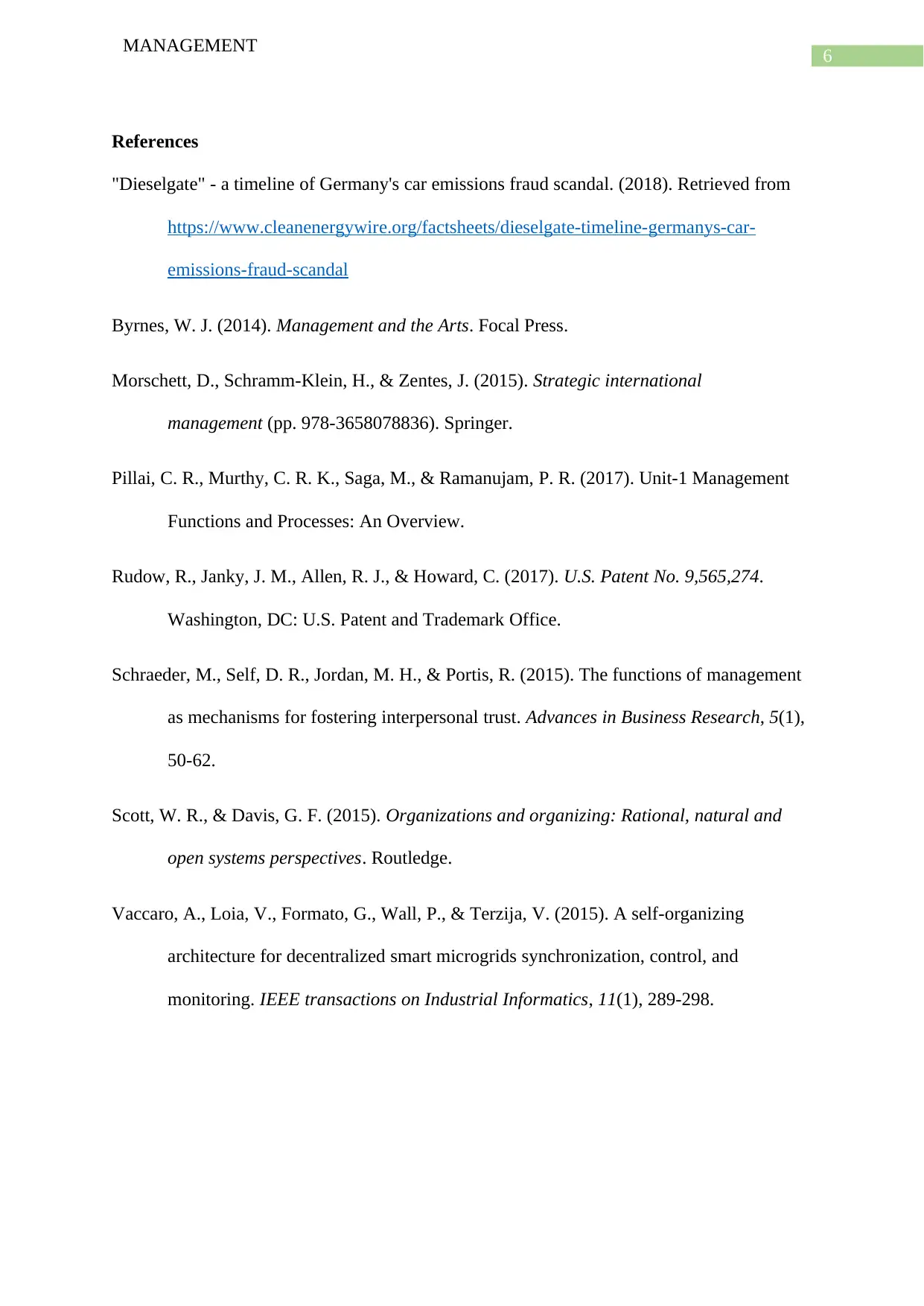
6
MANAGEMENT
References
"Dieselgate" - a timeline of Germany's car emissions fraud scandal. (2018). Retrieved from
https://www.cleanenergywire.org/factsheets/dieselgate-timeline-germanys-car-
emissions-fraud-scandal
Byrnes, W. J. (2014). Management and the Arts. Focal Press.
Morschett, D., Schramm-Klein, H., & Zentes, J. (2015). Strategic international
management (pp. 978-3658078836). Springer.
Pillai, C. R., Murthy, C. R. K., Saga, M., & Ramanujam, P. R. (2017). Unit-1 Management
Functions and Processes: An Overview.
Rudow, R., Janky, J. M., Allen, R. J., & Howard, C. (2017). U.S. Patent No. 9,565,274.
Washington, DC: U.S. Patent and Trademark Office.
Schraeder, M., Self, D. R., Jordan, M. H., & Portis, R. (2015). The functions of management
as mechanisms for fostering interpersonal trust. Advances in Business Research, 5(1),
50-62.
Scott, W. R., & Davis, G. F. (2015). Organizations and organizing: Rational, natural and
open systems perspectives. Routledge.
Vaccaro, A., Loia, V., Formato, G., Wall, P., & Terzija, V. (2015). A self-organizing
architecture for decentralized smart microgrids synchronization, control, and
monitoring. IEEE transactions on Industrial Informatics, 11(1), 289-298.
MANAGEMENT
References
"Dieselgate" - a timeline of Germany's car emissions fraud scandal. (2018). Retrieved from
https://www.cleanenergywire.org/factsheets/dieselgate-timeline-germanys-car-
emissions-fraud-scandal
Byrnes, W. J. (2014). Management and the Arts. Focal Press.
Morschett, D., Schramm-Klein, H., & Zentes, J. (2015). Strategic international
management (pp. 978-3658078836). Springer.
Pillai, C. R., Murthy, C. R. K., Saga, M., & Ramanujam, P. R. (2017). Unit-1 Management
Functions and Processes: An Overview.
Rudow, R., Janky, J. M., Allen, R. J., & Howard, C. (2017). U.S. Patent No. 9,565,274.
Washington, DC: U.S. Patent and Trademark Office.
Schraeder, M., Self, D. R., Jordan, M. H., & Portis, R. (2015). The functions of management
as mechanisms for fostering interpersonal trust. Advances in Business Research, 5(1),
50-62.
Scott, W. R., & Davis, G. F. (2015). Organizations and organizing: Rational, natural and
open systems perspectives. Routledge.
Vaccaro, A., Loia, V., Formato, G., Wall, P., & Terzija, V. (2015). A self-organizing
architecture for decentralized smart microgrids synchronization, control, and
monitoring. IEEE transactions on Industrial Informatics, 11(1), 289-298.
1 out of 7
Related Documents
Your All-in-One AI-Powered Toolkit for Academic Success.
+13062052269
info@desklib.com
Available 24*7 on WhatsApp / Email
![[object Object]](/_next/static/media/star-bottom.7253800d.svg)
Unlock your academic potential
Copyright © 2020–2025 A2Z Services. All Rights Reserved. Developed and managed by ZUCOL.





